Ethical Planning Document: Research on Pain Relief for Dementia
VerifiedAdded on 2023/06/03
|7
|1410
|138
Report
AI Summary
This report addresses the ethical considerations involved in conducting research on pain relief for dementia patients following orthopaedic surgery, in light of the observation that these patients may not receive adequate pain management compared to those without dementia. It identifies key values and principles from the Australian National Statement of Ethical Conduct, emphasizing the importance of patient well-being and ethical responsibilities of healthcare staff. It also discusses specific ethical considerations relevant to research participants, including the need for improved pain assessment and management strategies tailored to dementia patients. Mitigation strategies are proposed to ensure ethical obligations are met, such as involving carers in decision-making, enhancing communication, and providing comprehensive post-hospitalization support. The report highlights the importance of awareness, training, and ethical conduct in improving the care and pain management of dementia patients.

Assessment 3 – Ethics Planning Document
Paraphrase This Document
Need a fresh take? Get an instant paraphrase of this document with our AI Paraphraser
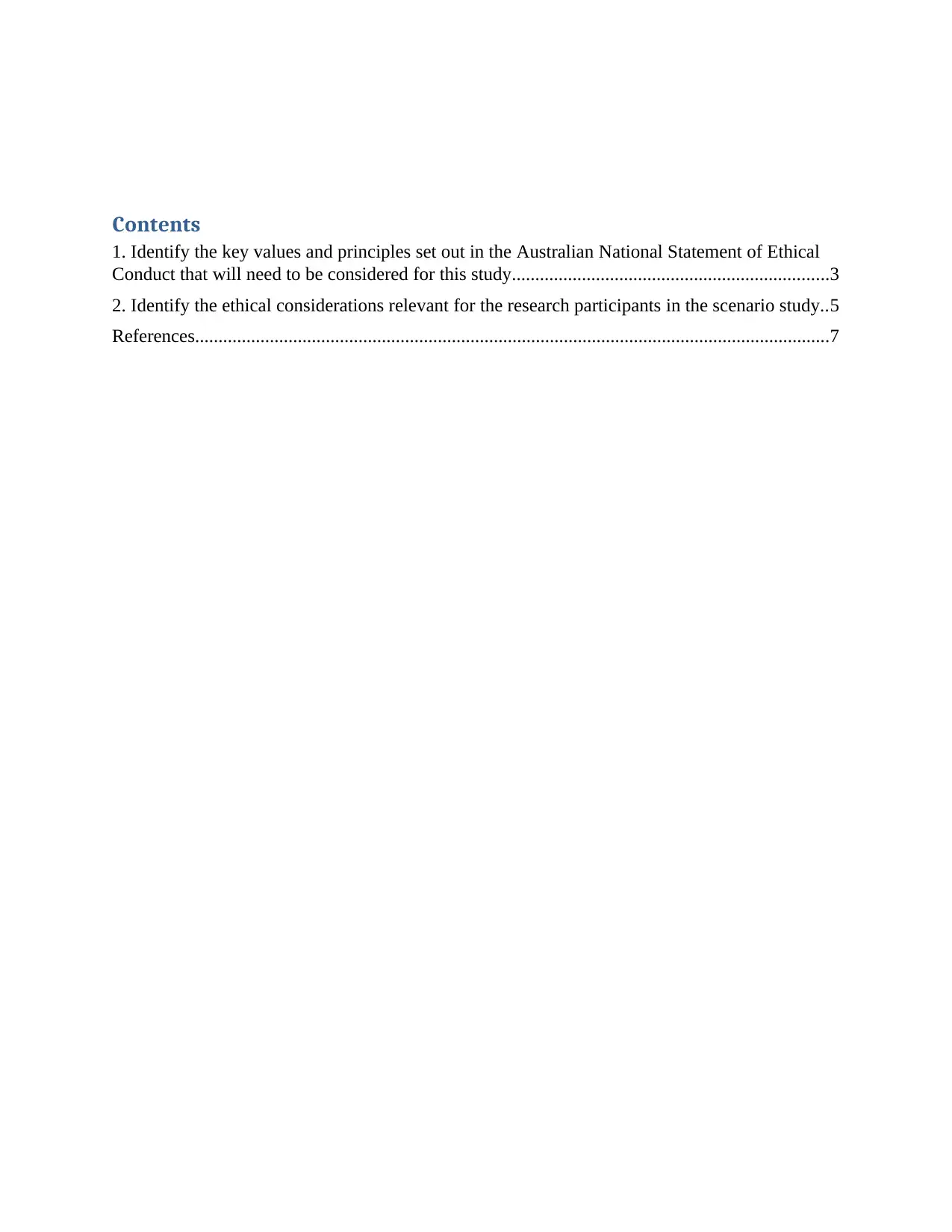
Contents
1. Identify the key values and principles set out in the Australian National Statement of Ethical
Conduct that will need to be considered for this study....................................................................3
2. Identify the ethical considerations relevant for the research participants in the scenario study..5
References........................................................................................................................................7
1. Identify the key values and principles set out in the Australian National Statement of Ethical
Conduct that will need to be considered for this study....................................................................3
2. Identify the ethical considerations relevant for the research participants in the scenario study..5
References........................................................................................................................................7
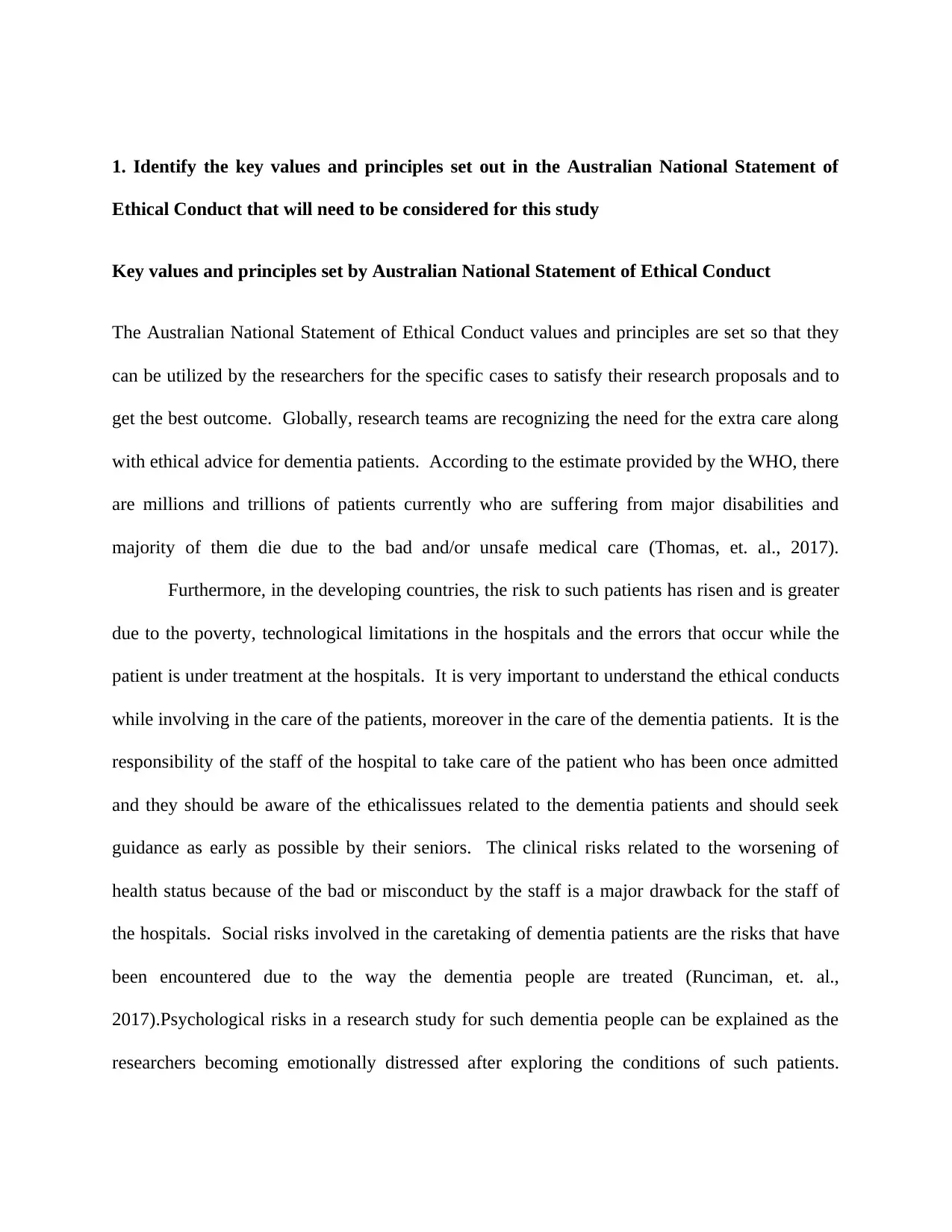
1. Identify the key values and principles set out in the Australian National Statement of
Ethical Conduct that will need to be considered for this study
Key values and principles set by Australian National Statement of Ethical Conduct
The Australian National Statement of Ethical Conduct values and principles are set so that they
can be utilized by the researchers for the specific cases to satisfy their research proposals and to
get the best outcome. Globally, research teams are recognizing the need for the extra care along
with ethical advice for dementia patients. According to the estimate provided by the WHO, there
are millions and trillions of patients currently who are suffering from major disabilities and
majority of them die due to the bad and/or unsafe medical care (Thomas, et. al., 2017).
Furthermore, in the developing countries, the risk to such patients has risen and is greater
due to the poverty, technological limitations in the hospitals and the errors that occur while the
patient is under treatment at the hospitals. It is very important to understand the ethical conducts
while involving in the care of the patients, moreover in the care of the dementia patients. It is the
responsibility of the staff of the hospital to take care of the patient who has been once admitted
and they should be aware of the ethicalissues related to the dementia patients and should seek
guidance as early as possible by their seniors. The clinical risks related to the worsening of
health status because of the bad or misconduct by the staff is a major drawback for the staff of
the hospitals. Social risks involved in the caretaking of dementia patients are the risks that have
been encountered due to the way the dementia people are treated (Runciman, et. al.,
2017).Psychological risks in a research study for such dementia people can be explained as the
researchers becoming emotionally distressed after exploring the conditions of such patients.
Ethical Conduct that will need to be considered for this study
Key values and principles set by Australian National Statement of Ethical Conduct
The Australian National Statement of Ethical Conduct values and principles are set so that they
can be utilized by the researchers for the specific cases to satisfy their research proposals and to
get the best outcome. Globally, research teams are recognizing the need for the extra care along
with ethical advice for dementia patients. According to the estimate provided by the WHO, there
are millions and trillions of patients currently who are suffering from major disabilities and
majority of them die due to the bad and/or unsafe medical care (Thomas, et. al., 2017).
Furthermore, in the developing countries, the risk to such patients has risen and is greater
due to the poverty, technological limitations in the hospitals and the errors that occur while the
patient is under treatment at the hospitals. It is very important to understand the ethical conducts
while involving in the care of the patients, moreover in the care of the dementia patients. It is the
responsibility of the staff of the hospital to take care of the patient who has been once admitted
and they should be aware of the ethicalissues related to the dementia patients and should seek
guidance as early as possible by their seniors. The clinical risks related to the worsening of
health status because of the bad or misconduct by the staff is a major drawback for the staff of
the hospitals. Social risks involved in the caretaking of dementia patients are the risks that have
been encountered due to the way the dementia people are treated (Runciman, et. al.,
2017).Psychological risks in a research study for such dementia people can be explained as the
researchers becoming emotionally distressed after exploring the conditions of such patients.
⊘ This is a preview!⊘
Do you want full access?
Subscribe today to unlock all pages.

Trusted by 1+ million students worldwide
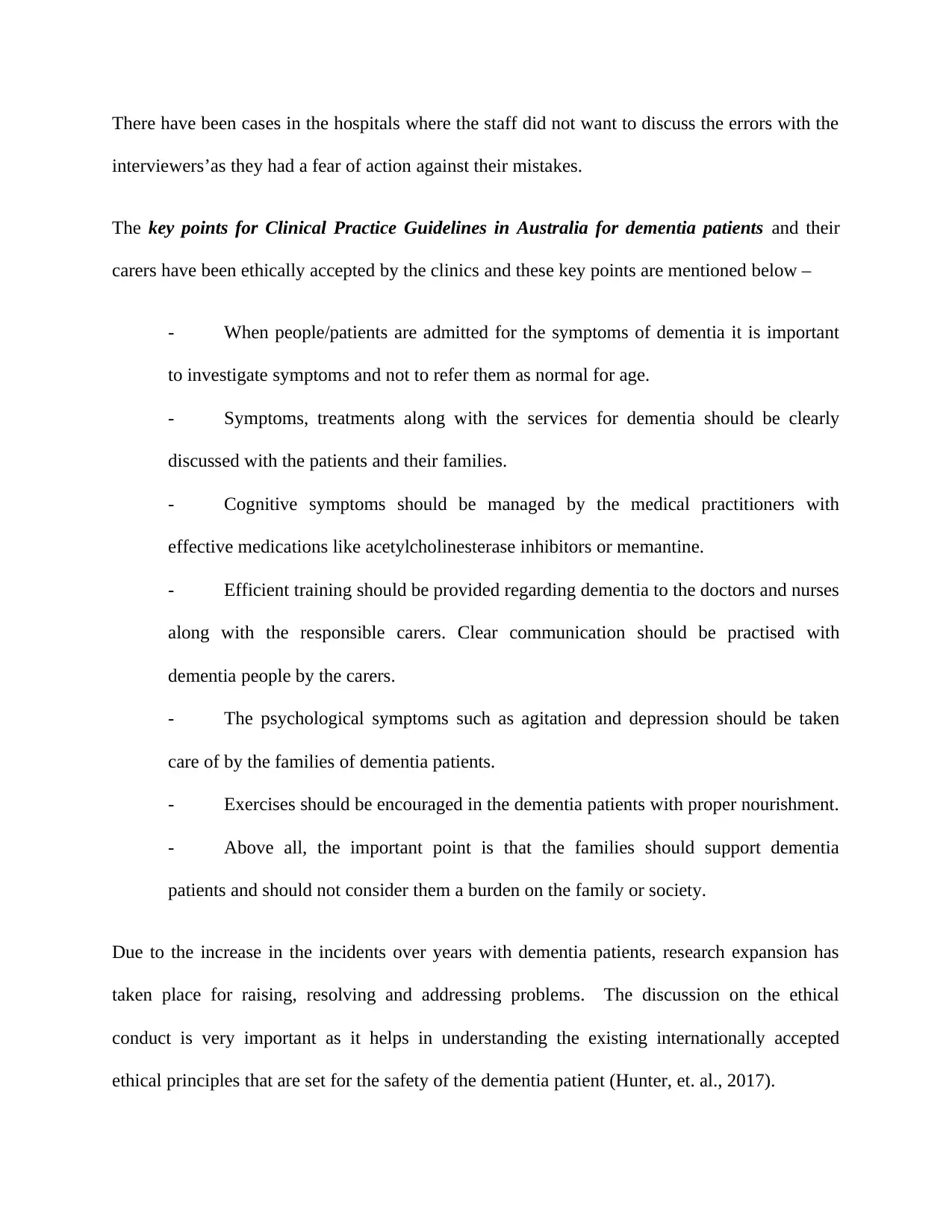
There have been cases in the hospitals where the staff did not want to discuss the errors with the
interviewers’as they had a fear of action against their mistakes.
The key points for Clinical Practice Guidelines in Australia for dementia patients and their
carers have been ethically accepted by the clinics and these key points are mentioned below –
- When people/patients are admitted for the symptoms of dementia it is important
to investigate symptoms and not to refer them as normal for age.
- Symptoms, treatments along with the services for dementia should be clearly
discussed with the patients and their families.
- Cognitive symptoms should be managed by the medical practitioners with
effective medications like acetylcholinesterase inhibitors or memantine.
- Efficient training should be provided regarding dementia to the doctors and nurses
along with the responsible carers. Clear communication should be practised with
dementia people by the carers.
- The psychological symptoms such as agitation and depression should be taken
care of by the families of dementia patients.
- Exercises should be encouraged in the dementia patients with proper nourishment.
- Above all, the important point is that the families should support dementia
patients and should not consider them a burden on the family or society.
Due to the increase in the incidents over years with dementia patients, research expansion has
taken place for raising, resolving and addressing problems. The discussion on the ethical
conduct is very important as it helps in understanding the existing internationally accepted
ethical principles that are set for the safety of the dementia patient (Hunter, et. al., 2017).
interviewers’as they had a fear of action against their mistakes.
The key points for Clinical Practice Guidelines in Australia for dementia patients and their
carers have been ethically accepted by the clinics and these key points are mentioned below –
- When people/patients are admitted for the symptoms of dementia it is important
to investigate symptoms and not to refer them as normal for age.
- Symptoms, treatments along with the services for dementia should be clearly
discussed with the patients and their families.
- Cognitive symptoms should be managed by the medical practitioners with
effective medications like acetylcholinesterase inhibitors or memantine.
- Efficient training should be provided regarding dementia to the doctors and nurses
along with the responsible carers. Clear communication should be practised with
dementia people by the carers.
- The psychological symptoms such as agitation and depression should be taken
care of by the families of dementia patients.
- Exercises should be encouraged in the dementia patients with proper nourishment.
- Above all, the important point is that the families should support dementia
patients and should not consider them a burden on the family or society.
Due to the increase in the incidents over years with dementia patients, research expansion has
taken place for raising, resolving and addressing problems. The discussion on the ethical
conduct is very important as it helps in understanding the existing internationally accepted
ethical principles that are set for the safety of the dementia patient (Hunter, et. al., 2017).
Paraphrase This Document
Need a fresh take? Get an instant paraphrase of this document with our AI Paraphraser
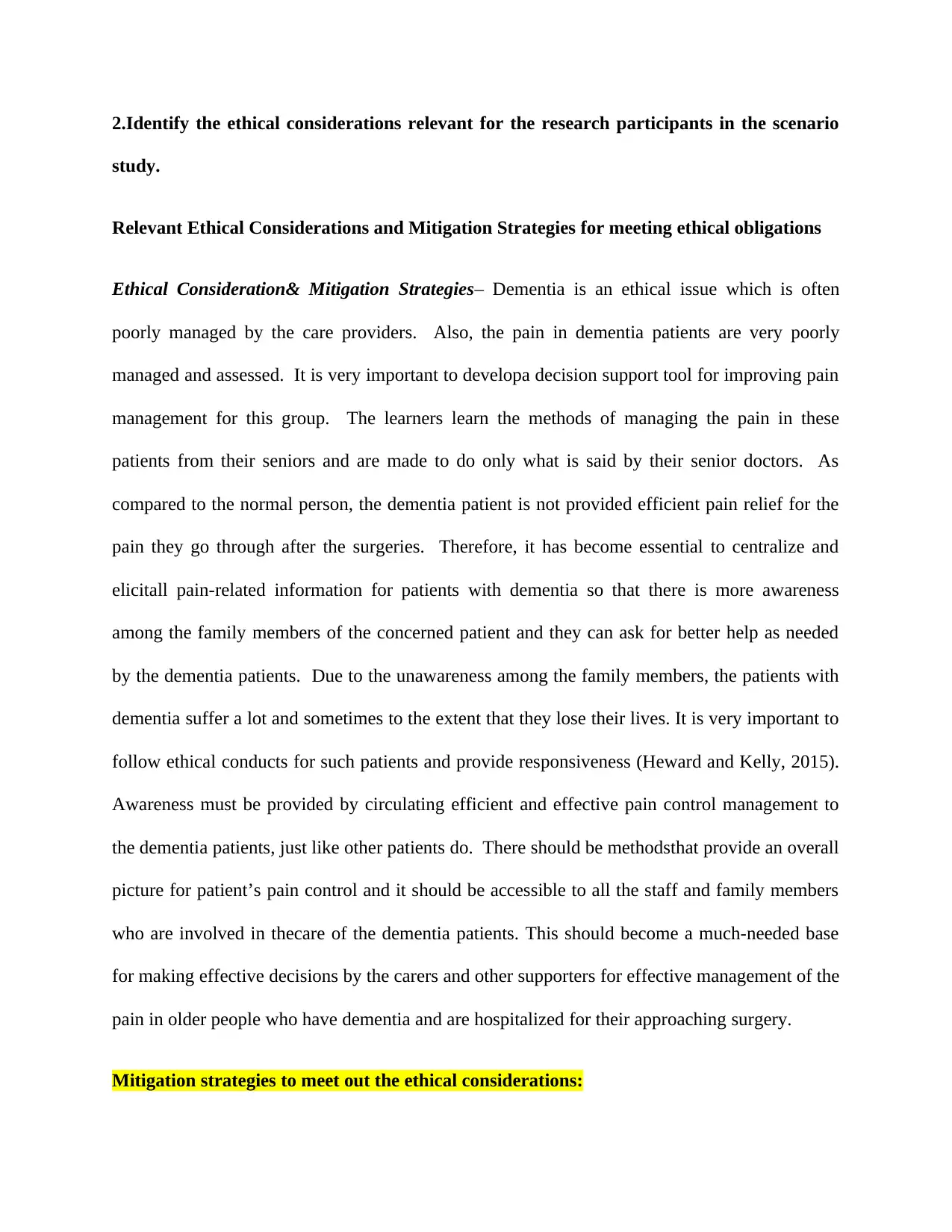
2.Identify the ethical considerations relevant for the research participants in the scenario
study.
Relevant Ethical Considerations and Mitigation Strategies for meeting ethical obligations
Ethical Consideration& Mitigation Strategies– Dementia is an ethical issue which is often
poorly managed by the care providers. Also, the pain in dementia patients are very poorly
managed and assessed. It is very important to developa decision support tool for improving pain
management for this group. The learners learn the methods of managing the pain in these
patients from their seniors and are made to do only what is said by their senior doctors. As
compared to the normal person, the dementia patient is not provided efficient pain relief for the
pain they go through after the surgeries. Therefore, it has become essential to centralize and
elicitall pain-related information for patients with dementia so that there is more awareness
among the family members of the concerned patient and they can ask for better help as needed
by the dementia patients. Due to the unawareness among the family members, the patients with
dementia suffer a lot and sometimes to the extent that they lose their lives. It is very important to
follow ethical conducts for such patients and provide responsiveness (Heward and Kelly, 2015).
Awareness must be provided by circulating efficient and effective pain control management to
the dementia patients, just like other patients do. There should be methodsthat provide an overall
picture for patient’s pain control and it should be accessible to all the staff and family members
who are involved in thecare of the dementia patients. This should become a much-needed base
for making effective decisions by the carers and other supporters for effective management of the
pain in older people who have dementia and are hospitalized for their approaching surgery.
Mitigation strategies to meet out the ethical considerations:
study.
Relevant Ethical Considerations and Mitigation Strategies for meeting ethical obligations
Ethical Consideration& Mitigation Strategies– Dementia is an ethical issue which is often
poorly managed by the care providers. Also, the pain in dementia patients are very poorly
managed and assessed. It is very important to developa decision support tool for improving pain
management for this group. The learners learn the methods of managing the pain in these
patients from their seniors and are made to do only what is said by their senior doctors. As
compared to the normal person, the dementia patient is not provided efficient pain relief for the
pain they go through after the surgeries. Therefore, it has become essential to centralize and
elicitall pain-related information for patients with dementia so that there is more awareness
among the family members of the concerned patient and they can ask for better help as needed
by the dementia patients. Due to the unawareness among the family members, the patients with
dementia suffer a lot and sometimes to the extent that they lose their lives. It is very important to
follow ethical conducts for such patients and provide responsiveness (Heward and Kelly, 2015).
Awareness must be provided by circulating efficient and effective pain control management to
the dementia patients, just like other patients do. There should be methodsthat provide an overall
picture for patient’s pain control and it should be accessible to all the staff and family members
who are involved in thecare of the dementia patients. This should become a much-needed base
for making effective decisions by the carers and other supporters for effective management of the
pain in older people who have dementia and are hospitalized for their approaching surgery.
Mitigation strategies to meet out the ethical considerations:
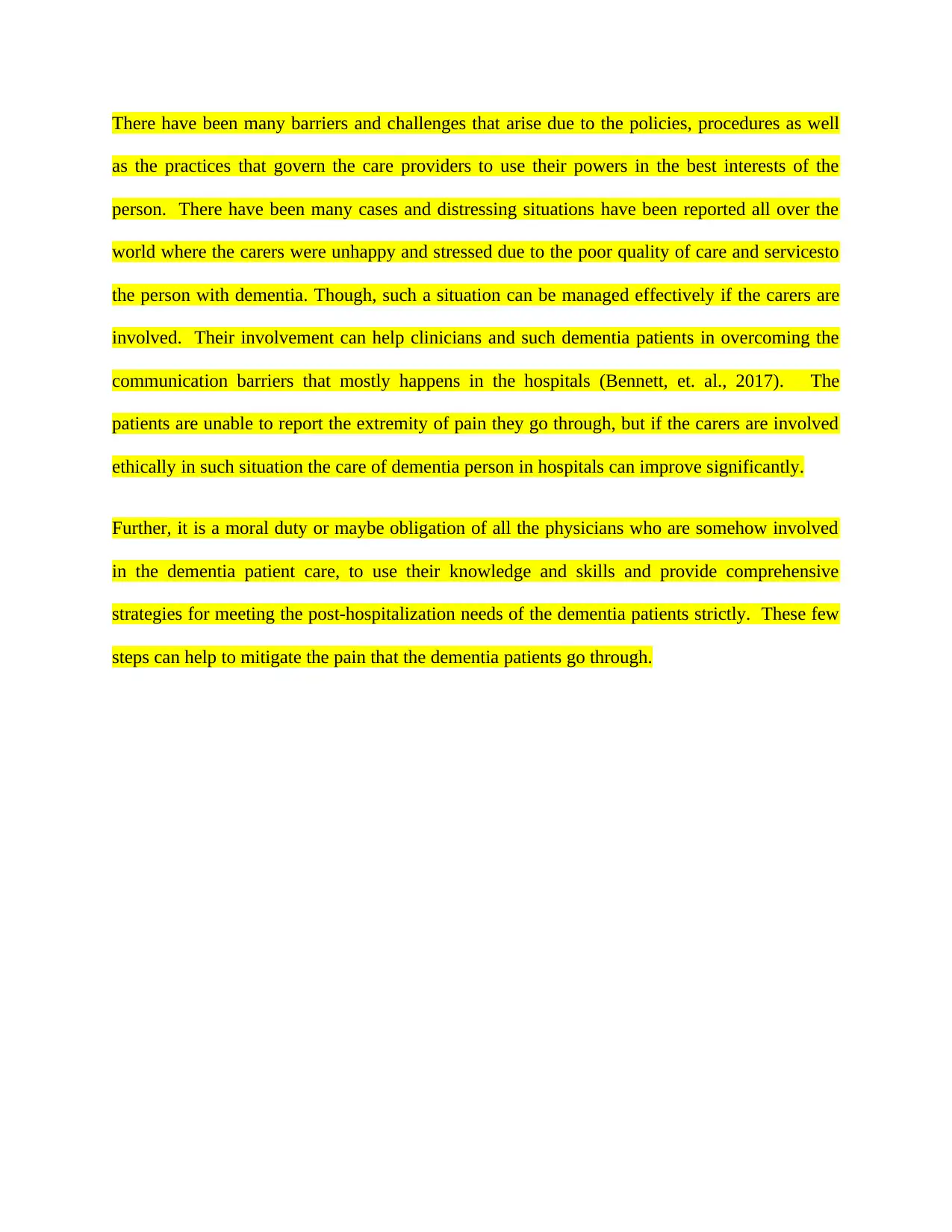
There have been many barriers and challenges that arise due to the policies, procedures as well
as the practices that govern the care providers to use their powers in the best interests of the
person. There have been many cases and distressing situations have been reported all over the
world where the carers were unhappy and stressed due to the poor quality of care and servicesto
the person with dementia. Though, such a situation can be managed effectively if the carers are
involved. Their involvement can help clinicians and such dementia patients in overcoming the
communication barriers that mostly happens in the hospitals (Bennett, et. al., 2017). The
patients are unable to report the extremity of pain they go through, but if the carers are involved
ethically in such situation the care of dementia person in hospitals can improve significantly.
Further, it is a moral duty or maybe obligation of all the physicians who are somehow involved
in the dementia patient care, to use their knowledge and skills and provide comprehensive
strategies for meeting the post-hospitalization needs of the dementia patients strictly. These few
steps can help to mitigate the pain that the dementia patients go through.
as the practices that govern the care providers to use their powers in the best interests of the
person. There have been many cases and distressing situations have been reported all over the
world where the carers were unhappy and stressed due to the poor quality of care and servicesto
the person with dementia. Though, such a situation can be managed effectively if the carers are
involved. Their involvement can help clinicians and such dementia patients in overcoming the
communication barriers that mostly happens in the hospitals (Bennett, et. al., 2017). The
patients are unable to report the extremity of pain they go through, but if the carers are involved
ethically in such situation the care of dementia person in hospitals can improve significantly.
Further, it is a moral duty or maybe obligation of all the physicians who are somehow involved
in the dementia patient care, to use their knowledge and skills and provide comprehensive
strategies for meeting the post-hospitalization needs of the dementia patients strictly. These few
steps can help to mitigate the pain that the dementia patients go through.
⊘ This is a preview!⊘
Do you want full access?
Subscribe today to unlock all pages.

Trusted by 1+ million students worldwide
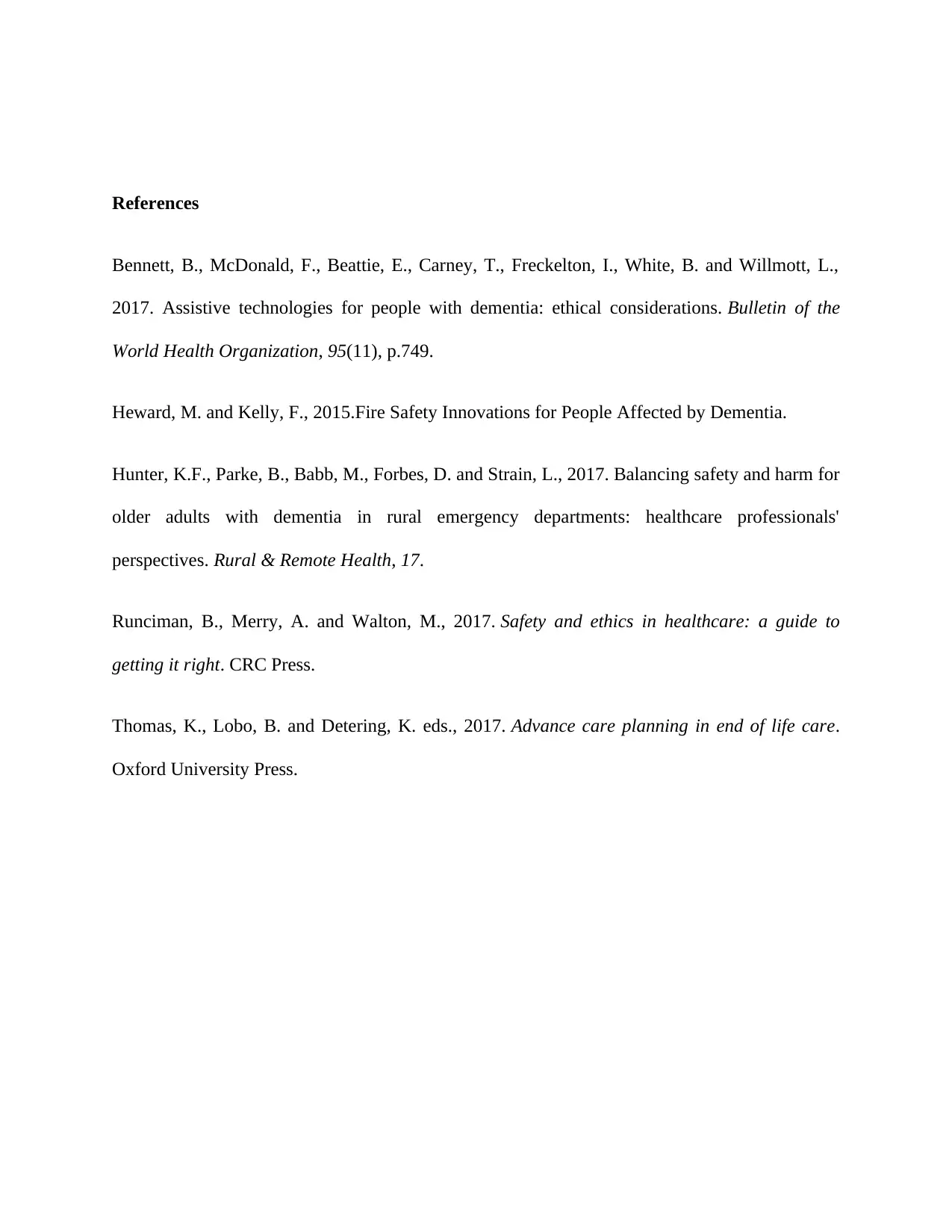
References
Bennett, B., McDonald, F., Beattie, E., Carney, T., Freckelton, I., White, B. and Willmott, L.,
2017. Assistive technologies for people with dementia: ethical considerations. Bulletin of the
World Health Organization, 95(11), p.749.
Heward, M. and Kelly, F., 2015.Fire Safety Innovations for People Affected by Dementia.
Hunter, K.F., Parke, B., Babb, M., Forbes, D. and Strain, L., 2017. Balancing safety and harm for
older adults with dementia in rural emergency departments: healthcare professionals'
perspectives. Rural & Remote Health, 17.
Runciman, B., Merry, A. and Walton, M., 2017. Safety and ethics in healthcare: a guide to
getting it right. CRC Press.
Thomas, K., Lobo, B. and Detering, K. eds., 2017. Advance care planning in end of life care.
Oxford University Press.
Bennett, B., McDonald, F., Beattie, E., Carney, T., Freckelton, I., White, B. and Willmott, L.,
2017. Assistive technologies for people with dementia: ethical considerations. Bulletin of the
World Health Organization, 95(11), p.749.
Heward, M. and Kelly, F., 2015.Fire Safety Innovations for People Affected by Dementia.
Hunter, K.F., Parke, B., Babb, M., Forbes, D. and Strain, L., 2017. Balancing safety and harm for
older adults with dementia in rural emergency departments: healthcare professionals'
perspectives. Rural & Remote Health, 17.
Runciman, B., Merry, A. and Walton, M., 2017. Safety and ethics in healthcare: a guide to
getting it right. CRC Press.
Thomas, K., Lobo, B. and Detering, K. eds., 2017. Advance care planning in end of life care.
Oxford University Press.
1 out of 7
Related Documents
Your All-in-One AI-Powered Toolkit for Academic Success.
+13062052269
info@desklib.com
Available 24*7 on WhatsApp / Email
![[object Object]](/_next/static/media/star-bottom.7253800d.svg)
Unlock your academic potential
Copyright © 2020–2025 A2Z Services. All Rights Reserved. Developed and managed by ZUCOL.





